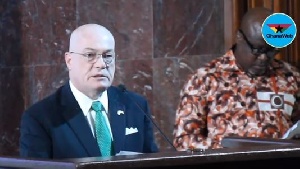The United States (US) says they are committed to supporting Ghana to strengthen its cyber security capacity to enable Ghanaians to educate themselves through internet access to compete in the 21st century economy.
Mr Robert P. Jackson, the US Ambassador to Ghana, explained that this would help lift Ghana’s economy to new heights.
“I am pleased that the government of Ghana is committed to doing the hard work of identifying and addressing cyber threats to ensure the people of this nation can fully and more securely benefit from their right to access to the internet and the fruits of information technology,” Mr Jackson stated at the opening of the National Cyber security Week 2017 Celebration in Accra.
The 2017 Cyber Security Week on the theme “Securing Ghana’s Digital Journey,” was launched by President Nana Addo Dankwa Akufo-Addo.
The annual Cyber security Week aims to create awareness of cyber security and anti-cybercrime initiatives and to build the capacity of different stakeholders within the cyber security ecosystem.
Mr Jackson described the National Cyber security Week Celebration as an excellent time to bring cyber security stakeholders together to discuss Ghana’s cyber threat environment and develop innovative solutions that migrate cyber threats and promote a culture of cyber awareness.
It also provides an opportunity for local and international stakeholders to engage and share ideas on cyber security initiatives being pursued within the industry and best practices.
He said businesses, government, and private citizens had come to depend on an internet that was open, secure and reliable; adding “Digital technology and connectivity were critical to our daily lives and we must act to protect against malicious actors that use the internet to commit crimes”.
“Cyber threats come from state-sponsored actors, criminal organisations and individual actors. They can harm our society, do substantial damage to our infrastructure, and have an enormous impact on our economies.”
He said there were threats to ordinary internet users and declared that a concern in Ghana was the debt card fraud.
“Criminals target retail outlets – stores, restaurants, and gas stations – where they steal our PIN numbers for their own use and to sell to others,” he said.
He said internet fraudsters, often referred to as “sakawa boys”, had been victimising people across the world and hurt Ghana’s international reputation.
Mr Jackson said anonymity offered by the internet required users everywhere to be vigilant and take steps to verify and protect online information.
“As we develop responses to identify vulnerabilities, criminals are already looking to exploit another security gap. No single government or organisation has all the resources and expertise required to combat the advanced persistent cyber-attacks that are being launched today,” he said. He noted that a vibrant partnership between the public and private sectors was essential to implementing an effective cyber security policy; stating that “defending against the threat of cybercriminal activity requires a comprehensive and collaborative approach”.
Mr Jackson lauded Ghana’s effort to accede to the Budapest Convention on Cybercrime, an international treaty designed to address cybercrime by harmonising national laws and increasing cooporation among nations.
“This is a significant step in bringing Ghana’s already strong cyber security legal framework into greater alignment with the international community. When completed, it will form a foundation for our robust cooperation on combating cybercrimes against citizens across borders.”
Mrs Ursula Owusu-Ekuful, Minister of Communications, said the Ministry, which had oversight responsibility for the government’s digitalisation agenda and was actively working to ensure the success of the initiatives being implemented by government including the National Identification System, the National Digital Property Addressing System and a Number of E-government Projects.
“We recognise that ICTs are indispensable for development and have a cross cutting nature and are determined to do our best to enable government’s vision of massive transformation of the economy through technology succeed,” she stated.
Mr Albert Antwi-Boasiako, National Cyber security Advisor, said Ghana’s cybersecurity readiness was rated below 35 per cent by the International Telecommunications Union (ITU), which calls for serious business across all levels – people, businesses and government.
Business News of Tuesday, 24 October 2017
Source: ghananewsagency.org













